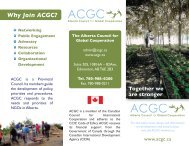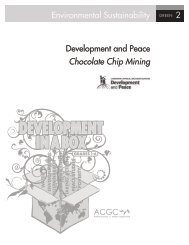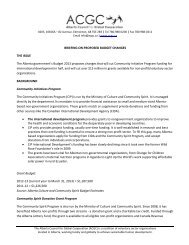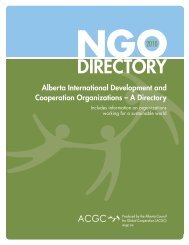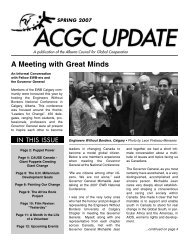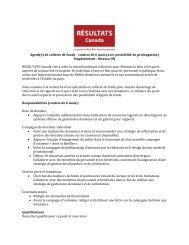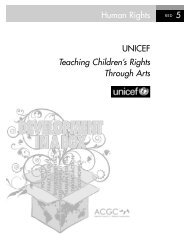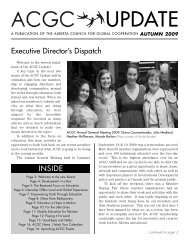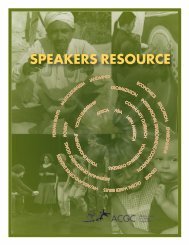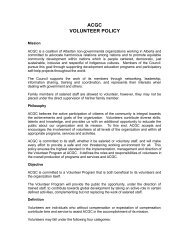stand up and lead! - SCERDO
stand up and lead! - SCERDO
stand up and lead! - SCERDO
Create successful ePaper yourself
Turn your PDF publications into a flip-book with our unique Google optimized e-Paper software.
<strong>st<strong>and</strong></strong> <strong>up</strong> <strong>and</strong> <strong>lead</strong>!<br />
Youth action, Multiculturalism, Leadership <strong>and</strong><br />
Community Growth Program
Somali Canadian Education <strong>and</strong> Rural Development Organization<br />
The broad purpose of the Somali Canadian Education <strong>and</strong> Rural Development Organization<br />
(<strong>SCERDO</strong>) is to promote the educational needs of all Somalis <strong>and</strong> Canadians at home <strong>and</strong><br />
around the world. <strong>SCERDO</strong> advocates the needs of rural Somalia <strong>and</strong> Canada including<br />
economic development, community enhancement, environmental protection, <strong>and</strong> effective<br />
use of available resources. <strong>SCERDO</strong> believes that education <strong>and</strong> rural development is a<br />
pre-requisite for the social <strong>and</strong> economic development of Somalis at home <strong>and</strong> abroad.<br />
<strong>SCERDO</strong> is a valuable addition to the many agencies <strong>and</strong> organizations that are engaged<br />
in assisting <strong>and</strong> nurturing the development of Somalis <strong>and</strong> Canadians around the world.<br />
Contact:<br />
Bashir Ahmed, Executive Director, Project Leader Abdisamad Ali, Youth Leader<br />
12052 Fort Road 12052 Fort Road<br />
Edmonton, Alberta T5B 4H1<br />
Edmonton, Alberta T5B 4H1<br />
: 780-491-0233 : 780-491-0233<br />
: scerdo1@yahoo.com : abdisamad_ali@hotmail.co.uk<br />
Youth Action for Fostering Multiculturalism, Leadership <strong>and</strong> Community Growth<br />
Lifeplanning, Mentorship, <strong>and</strong> Public Education Program design <strong>and</strong> coordination:<br />
Kiran Choudhry, MA <strong>and</strong> Lynette Shultz, PhD<br />
Workbook graphics <strong>and</strong> design:<br />
Chitpreet Sethi<br />
Funding s<strong>up</strong>port for this project provided by<br />
Human Rights,<br />
Citizenship <strong>and</strong><br />
Multiculturalism<br />
EDUCATION<br />
FUND
4 Youth Leadership <strong>and</strong> Community Growth<br />
5 Program Outline<br />
6 Workshops<br />
7 Speakers<br />
8 Mentorship Guidelines<br />
9 Discussion Outline<br />
10 Reflection<br />
11 Goals<br />
12 Imagining Life<br />
13 Public Education Plan<br />
15 Public Outreach Schedule sheet<br />
This workbook contains program<br />
outline <strong>and</strong> goals, workshops <strong>and</strong><br />
speaker information, mentorship<br />
discussion guidelines, lifeplanning<br />
worksheets, <strong>and</strong> public education <strong>and</strong><br />
outreach planning sheets.
YOUTH LEADERSHIP AND<br />
COMMUNITY GROWTH<br />
Background<br />
In 2007, the Somali Canadian Education <strong>and</strong> Rural<br />
Development Organization (<strong>SCERDO</strong>), <strong>and</strong> the<br />
Alberta Somali Association for Advocacy <strong>and</strong> S<strong>up</strong>port<br />
(ASAAS), in partnership with the Community<br />
Partnership Enhancement Fund <strong>and</strong> Multicultural<br />
Health Brokers Co-op, conducted a needs assessment<br />
which focused on: highlighting the challenges faced<br />
by Somalis (particularly women <strong>and</strong> youth) in their<br />
resettlement process; increasing the profile of the<br />
Somali community; identifying needs <strong>and</strong> proposing<br />
solutions; establishing cross cultural relations; <strong>and</strong>,<br />
s<strong>up</strong>porting service providing agencies to improve<br />
their service delivery to the Somali community, <strong>and</strong><br />
the refugee / immigrant community as a whole.<br />
Needs Assessment <strong>and</strong><br />
Recommended Responses<br />
To address the needs established, the following<br />
recommendations were made by Somali youth:<br />
1. Crime prevention: Somali community<br />
organizations, government, <strong>and</strong> lawenforcement<br />
agencies could work together to<br />
establish Somali youth violence prevention<br />
programs <strong>and</strong> strategies.<br />
2. Employability: All levels of governments<br />
<strong>and</strong> service providing agencies could put<br />
increased effort in helping young Somalis<br />
attain interpersonal skills in order to get<br />
meaningful, sustained employment.<br />
3. Leadership: Somali community<br />
organizations could involve youth in designing<br />
<strong>and</strong> creating innovative <strong>and</strong> experiential<br />
programs <strong>and</strong> activities where youth can<br />
exchange ideas <strong>and</strong> develop a sense that they<br />
are the future <strong>lead</strong>ers of the community. In<br />
order to boost the morale <strong>and</strong> self-esteem of<br />
Somali youth, Somali parents, community<br />
<strong>lead</strong>ers, <strong>and</strong> respected elders could be more<br />
positive <strong>and</strong> encouraging. Youth would like<br />
to be respected for their ideas, recognized<br />
their efforts, <strong>and</strong> acknowledged for their<br />
achievements.<br />
4. Mentorship <strong>and</strong> guidance: Somali scholars<br />
<strong>and</strong> academics, University/College students,<br />
<strong>and</strong> other professionals could play a <strong>lead</strong>ing<br />
role in creating an effective mentorship<br />
program for Somali youth <strong>and</strong> children.<br />
5. School-based counselling: Edmonton<br />
Schools where a high number of Somali<br />
students are enrolled, could consider hiring<br />
counsellors who have a better under<strong>st<strong>and</strong></strong>ing<br />
of the issues faced by Somali youth, <strong>and</strong> the<br />
root causes of their problems.<br />
6. Safe, personal space: Many Somali families<br />
live in overcrowded homes, thus, children<br />
often don’t have their own rooms or even<br />
relevant space to do their studies. Afterschool<br />
programs <strong>and</strong> a homework s<strong>up</strong>port system<br />
for Somali students could help to improve<br />
their academic achievements. Studies show<br />
that afterschool programs keep youth out of<br />
trouble, <strong>and</strong> engage their learning through<br />
informal means.<br />
Youth Action for Fostering<br />
Multiculturalism, Leadership <strong>and</strong><br />
Community Growth Project<br />
This project provides youth with programming <strong>and</strong><br />
opportunities to enhance their personal growth, life<br />
skills, formal education experience, employability,<br />
<strong>and</strong> community relations. It also aims to decrease<br />
the likelihood of our youth becoming involved in<br />
negative activities <strong>lead</strong>ing to crime <strong>and</strong> violence.<br />
The long term impacts then, will <strong>lead</strong> to constructive<br />
community involvement by youth, more confidence<br />
within our immigrant <strong>and</strong> refugee communities,<br />
<strong>and</strong> greater appreciation of diversity <strong>and</strong> inclusion<br />
within our mainstream society. With all of our parts<br />
working together, our communities <strong>and</strong> our City<br />
will become stronger as a whole.<br />
My humanity is bound <strong>up</strong> in yours, for we can only<br />
be human together<br />
~Desmond Tutu
PROGRAM OUTLINE<br />
Stage 1: Empowerment<br />
Lifeplan delivery <strong>and</strong> Mentorship<br />
Delivery of the Lifeplan program <strong>and</strong> concurrent<br />
mentorship sessions to youth<br />
Goal: To provide youth with informative <strong>and</strong><br />
motivating <strong>lead</strong>ers, <strong>and</strong> interactive discussion<br />
in pursuit of developing their individualized<br />
Lifeplans, with the aim of increasing personal<br />
empowerment.<br />
Activities: Development of Lifeplan programming;<br />
10 informative, interactive workshops; concurrent<br />
one-on-one Mentorship sessions; <strong>and</strong> individualized<br />
Lifeplans*.<br />
Stage 2: Public Education<br />
Institutional engagement <strong>and</strong> community outreach<br />
Development <strong>and</strong> delivery of public education<br />
program to stakeholders by youth<br />
Goal: To assist youth to form a gro<strong>up</strong> <strong>and</strong> help<br />
them develop a program they will deliver to key<br />
stakeholders, partners, peers, <strong>and</strong> policy-makers,<br />
with the aim of community outreach <strong>and</strong> increased<br />
institutional engagement.<br />
Activities: Creation of Youth Gro<strong>up</strong> out of participants;<br />
drafting <strong>and</strong> approval of Vision <strong>and</strong> M<strong>and</strong>ate;<br />
Production of core materials to be presented;<br />
partnerships; Report; meeting plan <strong>and</strong> timeline; <strong>and</strong><br />
minimum of 5 meetings with 5 different gro<strong>up</strong>s.<br />
Home<br />
Community & Life<br />
in Canada <strong>and</strong><br />
Our World<br />
LIFEPLAN<br />
&<br />
MENTORSHIP<br />
THEMES<br />
Education<br />
* A Lifeplan is a way to set order,<br />
achieve realistic goals, <strong>and</strong> celebrate<br />
accomplishment in life. The purpose<br />
of Lifeplan programming to enable<br />
you to achieve success in all parts of<br />
your life, <strong>and</strong> enable you to become a<br />
<strong>lead</strong>er in your community.<br />
Security,<br />
Public Safety,<br />
& the Law<br />
Employment &<br />
Interpersonal<br />
Skills<br />
Graduation<br />
Upon successful graduation of this program, you will receive:<br />
Official Certificate of Completion<br />
Professional resume with references<br />
Network of highly skilled <strong>and</strong> well connected professionals<br />
Peer s<strong>up</strong>port system
WORKSHOPS<br />
Month DATE Topic / Description Speakers Time<br />
March - August<br />
One-on-one Mentorship<br />
Sessions<br />
Somali Students’ Association<br />
Determined with<br />
your mentor<br />
March 14 th Home<br />
Oliver Kamau, Edmonton Immigrant Services Association /<br />
Marcus Fung, Music teacher<br />
K’naan Warsame, Somali Poet <strong>and</strong> Hip Hop Artist<br />
2:00 – 7:00 pm<br />
April<br />
4 th<br />
Nene Ernest Khalema, Assistant Professor, University of<br />
Employment & Calgary Social Work<br />
2:00 – 6:00 pm<br />
Interpersonal skills<br />
18 th Marlon Wilson, Music for Mavericks, Politic Live 3:00 – 6:00 pm<br />
9 th<br />
Malcolm Azania, Author, Journalist<br />
3:00 – 6:00 pm<br />
May<br />
Education<br />
23 rd Malcolm Azania, Author, Journalist 3:00 – 6:00 pm<br />
June<br />
6 th<br />
Security, Public Safety &<br />
the Law<br />
Zak Sheikh, Muslim Chaplain, University of Alberta<br />
3:00 – 5:00 pm<br />
20 th Abdullahi Roble, Teacher, Educational Consultant 3:00 – 5:00 pm<br />
July<br />
4 th<br />
Community & Life in<br />
Canada<br />
Jonathan Rivero, Qi Creative, Occ<strong>up</strong>ational Therapist<br />
3:00 – 6:00 pm<br />
18 th<br />
Community & Life in<br />
Our World<br />
Vladimir Gomez, Program Manager, Canada World Youth,<br />
People’s Poets<br />
3:00 – 6:00 pm<br />
8 th<br />
Somali <strong>lead</strong>ers! That means YOU!<br />
3:00 – 6:00 pm<br />
August<br />
22 nd<br />
Home<br />
Oliver Kamau, Edmonton Immigrant Services Association /<br />
Marcus Fung, Music teacher<br />
3:00 – 6:00 pm<br />
September ~ Break<br />
Please note: Unless advised otherwise, all workshops will be held at the <strong>SCERDO</strong> Office 12052 Fort Road, 780-491-0233
SPEAKERS<br />
Malcolm Azania is writer, journalist,<br />
broadcaster, community activist, <strong>and</strong> author<br />
of the acclaimed novels From the Notebooks of<br />
Doctor Brain <strong>and</strong> The Coyote Kings of the Space-<br />
Age Bachelor Pad published by R<strong>and</strong>om House.<br />
Malcolm has worked with numerous community gro<strong>up</strong>s<br />
across Canada on issues such as former child soldiers in<br />
Sierra Leone, famine relief in Ethiopia, war-relief in Iraq,<br />
<strong>and</strong> humanitarian assistance in Palestine.<br />
Abdullahi Roble is originally from Somali <strong>and</strong><br />
has 25 years of teaching <strong>and</strong> community service<br />
experience throughout Canada. He also has 15<br />
years experience working as an educational<br />
consultant with a diversity of immigrant<br />
communities in the Greater Toronto Area. Abdullahi<br />
is a highly respected educator, <strong>lead</strong>er, <strong>and</strong> community<br />
representative <strong>and</strong> is currently serving as the Educational<br />
Consultant for <strong>SCERDO</strong>.<br />
Marcus Fung is a music teacher <strong>and</strong> musician<br />
who facilitates personal development <strong>and</strong><br />
community strengthening through art.<br />
Currently, Marcus is conducting a number<br />
of afterschool programs in Edmonton, <strong>and</strong> is<br />
working to exp<strong>and</strong> his programming to include more youth<br />
<strong>and</strong> adults.<br />
Vladimir Gomez <strong>and</strong> his family came to Canada<br />
as refugees from Chile, an experience that shaped<br />
his political <strong>and</strong> educational formation. Vlad<br />
has a Master of Education in International <strong>and</strong><br />
Global Education, is the Program Manager for<br />
Canada World Youth, <strong>and</strong> an MC in the People’s Poets.<br />
Oliver Kamau was born in Kenya <strong>and</strong> taught<br />
high school for several years before coming to<br />
Canada in 1997 to pursue his graduate studies.<br />
Oliver is an experienced facilitator who uses<br />
experiential techniques to teach in areas such<br />
as anti-racism, diversity, <strong>and</strong> immigration. In 2005, Oliver<br />
published the widely used Race <strong>and</strong> Respect: An Anti-<br />
Racism Resource for Teachers.<br />
Nene Ernest Khalema is an Assistant Professor<br />
at the University of Calgary, Faculty of Social<br />
Work. Ernest’s research interests include<br />
immigrants, refugees, <strong>and</strong> community health.<br />
He has several years experience working with<br />
youth <strong>and</strong> educational institutions, helping to enable<br />
minority students <strong>and</strong> reform out-dated education<br />
practices.<br />
Jonathan Rivero is an occ<strong>up</strong>ational therapist<br />
who uses diverse mediums to encourage<br />
personal development. Jon has produced a<br />
number of programs for the Family Linkages<br />
Foundation <strong>and</strong> is currently operating his own<br />
company, Qi Creative, which uses rehabilitative techniques<br />
to help youth reach their full potential.<br />
Shaykh Zak Sheikh is the Muslim Chaplain<br />
at the University of Alberta. He grew <strong>up</strong> in<br />
Egypt, studied horticulture at the University<br />
of Cairo, <strong>and</strong> traveled widely in Europe before<br />
coming to Canada in 1978. Since then, Zak has<br />
been involved in Edmonton’s inter-faith <strong>and</strong> multicultural<br />
communities through the Immigration <strong>and</strong> Refugee Board<br />
of Canada <strong>and</strong> the local law enforcement <strong>and</strong> judicial<br />
systems.<br />
The Somali Students’ Association (SSA) is a youth-led<br />
gro<strong>up</strong> with students from the University of Alberta,<br />
Grant MacEwan College, <strong>and</strong> NAIT. The SSA promotes<br />
education <strong>and</strong> social prosperity among Somalis, providing<br />
opportunities for youth to connect, mentor each other, <strong>and</strong><br />
collaborate on issues that affect the Somali community,<br />
<strong>and</strong> the youth population at large.<br />
Marlon Wilson is part of one of Edmonton’s most<br />
nationally recognized hip-hop acts, Politic Live,<br />
<strong>and</strong> is the co-founder <strong>and</strong> co-CEO of Music For<br />
Mavericks Entertainment, a record label which<br />
has worked to improve the economic <strong>and</strong> social<br />
conditions of Edmonton’s less fortunate. By making music<br />
that is socially conscious, Marlon has helped bring to light<br />
important issues that affect our local communities, <strong>and</strong> by<br />
organizing events such as Hip Hop for Hunger, Marlon has<br />
become an important role model for our youth.<br />
K’naan Warsame was born in Mogadishu,<br />
Somalia <strong>and</strong> spent the early years of his<br />
life trying to avoid death <strong>and</strong> listening to<br />
hip-hop. After coming to Canada, he began<br />
producing music in the tradition of his family<br />
<strong>and</strong> homel<strong>and</strong>, calling his work “urgent music with a<br />
message”. His lyrics focus on real life, the state of the<br />
world, <strong>and</strong> are a call to ending unnecessary violence. He<br />
has performed at the United Nations, <strong>and</strong> has produced<br />
two highly celebrated albums The Dusty Foot Philosopher<br />
<strong>and</strong> Troubadour.
Mentorship guidelines<br />
The mentorship sessions are a vital<br />
part of the Lifeplanning process<br />
because they will be an opportunity<br />
for you to discuss some of your main<br />
concerns <strong>and</strong> learn how you can<br />
overcome your challenges. Here<br />
are some important guidelines<br />
that will help you get the most out<br />
of your mentorship sessions.<br />
What is a mentor?<br />
A mentor is a trusted friend or<br />
guide who can coach you through<br />
some of the difficulties you are<br />
facing. A mentor can help you work<br />
though problems you are having in<br />
school or with teachers, questions<br />
about jobs <strong>and</strong> your career, or<br />
issues you are having with your<br />
family or your friends.<br />
Why are mentors important?<br />
A mentor is an encouraging peer,<br />
someone who under<strong>st<strong>and</strong></strong>s where<br />
you are coming from, provides<br />
you with respect, positivity,<br />
<strong>and</strong> s<strong>up</strong>port, <strong>and</strong> someone who<br />
offers you constructive feedback<br />
<strong>and</strong> advice. By being a positive<br />
role model, the mentor plays an<br />
important part in your personal<br />
growth, empowerment <strong>and</strong><br />
eventual <strong>lead</strong>ership.<br />
Talking <strong>and</strong> listening about life<br />
The relationship between you <strong>and</strong><br />
your mentor should be a listening<br />
<strong>and</strong> evaluating exercise for the<br />
mentor, <strong>and</strong> an encouraging <strong>and</strong><br />
learning exercise for you. The<br />
mentor should listen to you very<br />
closely, <strong>and</strong> work with you to come<br />
<strong>up</strong> with plans for positive outcomes<br />
for your life.<br />
Being honest with yourself<br />
One of the most important parts of<br />
your mentorship sessions is that<br />
you can be honest about yourself,<br />
your experiences, <strong>and</strong> your<br />
thoughts. You can talk about your<br />
frustrations, things that make you<br />
angry, <strong>and</strong> instances when you<br />
have been hurt. These are not easy<br />
to talk about, but feel free, feel<br />
safe, <strong>and</strong> be honest with yourself<br />
<strong>and</strong> your mentor. This way, you<br />
will learn who you are <strong>and</strong> who<br />
you really want to be.<br />
Shifting attitudes, being positive<br />
After discussing some of the<br />
negative aspects of your life, your<br />
mentor will ask questions <strong>and</strong><br />
guide discussion that will make<br />
you think positively. The goal is<br />
to focus on positive things in your<br />
life, what makes you happy <strong>and</strong><br />
complete, <strong>and</strong> makes the people<br />
around you feel comfortable. By<br />
thinking positively, you can focus<br />
your energy on what is good about<br />
your life <strong>and</strong> how you can make<br />
more of it happen.<br />
Goal-Oriented discussion: Imagining<br />
what is possible<br />
Once you feel comfortable with<br />
your mentor, you will focus on<br />
setting goals. It is important for<br />
your mentor to help you imagine<br />
what is possible for your life. Your<br />
mentor can help you think about<br />
what you want in your life, <strong>and</strong><br />
then work with you to come <strong>up</strong><br />
with a plan to get there. This is<br />
called goal setting <strong>and</strong> it is a vital<br />
part of personal development.<br />
What is mentorship?<br />
Why is it important for<br />
personal development <strong>and</strong><br />
community growth?<br />
Why are we doing it in this<br />
program?<br />
Mentorship is an opportunity<br />
for youth to learn about<br />
life through relationships<br />
with more experienced,<br />
trusted peers <strong>and</strong> teachers.<br />
Mentorship is a powerful way<br />
for youth to gain a variety<br />
of personal <strong>and</strong> professional<br />
skills that will help them<br />
become better at who they<br />
are <strong>and</strong> who they want to be.<br />
In fact, mentoring is one of<br />
the oldest forms of guidance.<br />
Scholars have noted that<br />
mentorship was a common<br />
learning tool in Africa, long<br />
before in any of the other<br />
ancient civilizations.
DiscussION Outline<br />
Things to think about when you are meeting with your mentor<br />
Greetings<br />
Think about 5 good things that happened to you last week.<br />
Think about 5 things in your life that make you happy.<br />
Home<br />
Key questions: What kind of life do I have? What’s going on in my life right now?<br />
Key words: Self, family, mother, father, brothers, sisters, lifestyle, food<br />
Education<br />
Key questions: What kinds of things do I want to know? How am I going to know them?<br />
Key words: teachers, subjects, learning, information, interests, thinking, class, friends, lunchtime, peers,<br />
relationships<br />
Employability & Interpersonal Skills<br />
Key questions: What kind of work do I want to do? How am I going to feed myself <strong>and</strong> my family? How am<br />
I going to provide?<br />
Key words: job, work, income, money, salary, finances, mortgage, computers, emailing, boss, co-workers, the<br />
office, professional development, career<br />
Security, Public Safety, & the Law<br />
Key questions: What makes me feel safe? What makes my family feel safe? How can I make my<br />
community more secure?<br />
Key words: law enforcement, laws, penalties, jail, safe, free, walking down the street, friends, children,<br />
park, schools<br />
Community <strong>and</strong> Life in Canada <strong>and</strong> Our World<br />
Key questions: In what kind of community do I want to live? In what kind of world do I want to live? How<br />
am I going to make a better community? How are we going to make a better community?<br />
Key words: family, friends, peers, building together, gro<strong>up</strong>, economy, betterment, human networks,<br />
participation, planning together for a bright future<br />
Home<br />
Key questions: What kind of life do I want? What are some things I want to do more of in my life?<br />
Key words: Self, my own family, children, husb<strong>and</strong>, wife, parents, house, Islam, Somalia, music, laughter<br />
Action plan<br />
Key questions: How am I going to be better? How am I going to make my life happen?
REFLECTION<br />
What was the best thing<br />
the mentor said to you?<br />
What do these<br />
discussions make you<br />
feel like doing?<br />
Did anything make you<br />
happy?<br />
Did anything make you<br />
angry?<br />
Did anything make you<br />
smile?<br />
What would you tell your<br />
friends about your<br />
discussions with your<br />
mentor?<br />
Do the discussions make<br />
you look at things a<br />
little differently?<br />
Do you feel different?<br />
Do you feel better?<br />
10<br />
10
GOALS<br />
Right now, I want to<br />
change<br />
Tomorrow, I will<br />
By next summer, I will<br />
In five years, I will<br />
When I am 30 years old,<br />
I will<br />
When I am old <strong>and</strong><br />
grey, I will<br />
11<br />
11
•<br />
•<br />
•<br />
Imagining Life<br />
•<br />
•<br />
•<br />
My Home<br />
•<br />
•<br />
•<br />
Our World<br />
My<br />
Education<br />
Our<br />
Community<br />
My Job<br />
•<br />
•<br />
Our Safety<br />
•<br />
•<br />
•<br />
•<br />
•<br />
•<br />
•<br />
12<br />
12
PUBLIC EDUCATION PLAN<br />
What do we want to do?<br />
How much time do we have?<br />
Who needs to be involved?<br />
Do we need money? How much do we have?<br />
13<br />
13
PUBLIC EDUCATION PLAN<br />
Our name<br />
Vision<br />
Mission<br />
Objectives<br />
Actions <strong>and</strong> Activities<br />
1.<br />
2.<br />
3.<br />
4.<br />
5.<br />
14
PUBLIC OUTREACH SCHEDULE SHEET<br />
Month Date Topic / Description Gro<strong>up</strong> Location Time<br />
October,<br />
November<br />
Youth Gro<strong>up</strong> formation; approval of Vision <strong>and</strong><br />
M<strong>and</strong>ate; founding documents; <strong>and</strong> public education,<br />
institutional engagement <strong>and</strong> community outreach<br />
plan<br />
Meeting 1<br />
December<br />
Meeting 2<br />
Meeting 3<br />
January<br />
Meeting 4<br />
Meeting 5<br />
February<br />
March<br />
Compilation of results<br />
Final report<br />
15<br />
15
All rights reserved.<br />
No part of this workbook shall be copied without<br />
written permission from the author. Copyright © 2009




